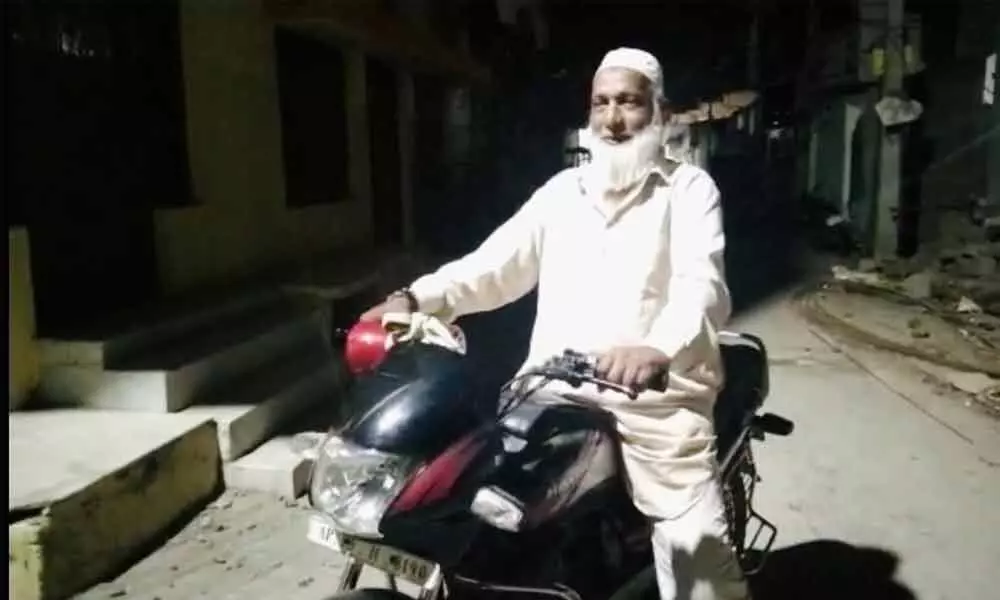Live
- Collaboration, innovation, PPP key to achieve 2047 goals: Jitendra Singh
- Portraits of National Leaders to be Unveiled in Karnataka Assembly Hall
- Kejriwal's claims on vision for development ridiculous: Delhi BJP
- One nation, one election need of the hour: Mukhtar Abbas Naqvi
- Educational Trips in South Kanara Put on Hold Following Murudeshwar Drowning Incident
- Karnataka Temple Embraces Mechanical Elephant for Cruelty-Free Ceremonies
- Temple modelled after Ram Mandir to be constructed in US
- Property dealer shot dead in broad daylight in Ranchi
- Maharashtra: CM Fadnavis expands Cabinet; inducts 39 ministers
- Winter Session of UP Assembly from Dec 16; CM seeks cooperation of all parties
Just In
Retired municipal inspector takes bike ride to give wakeup call to rozadars


Retired municipal inspector takes bike ride to give wakeup call to rozadars
The age-old tradition of giving a wake-up call to rozadars during the holy month of Ramzan has undergone a change keeping in tune with times. A group of fakirs singing naats (hymns) to wake up people for Sehri (pre-dawn meal) is one, and there were drummers.
Golconda: The age-old tradition of giving a wake-up call to rozadars during the holy month of Ramzan has undergone a change keeping in tune with times. A group of fakirs singing naats (hymns) to wake up people for Sehri (pre-dawn meal) is one, and there were drummers. Taking the tradition to a new level is 68-year-old retired municipal inspector Syed Osman. Starting at 2.30 am, Osman rides through the dark lanes of Golconda and its surrounding areas on his bike with a speaker playing a hymn of Sehri 'Rozedaro, uth jao sehri karo utho'.
Speaking to Hans India, Syed Osman said that since his retirement , he has been waking the community for a sehri at night. "Waking people for sehri is also a good deed. Riding my bike equipped with a sound system playing the hymn I reach localities to wake up people for sehri. I take the bike ride as I can reach more areas and more people," he says.
"I leave home at 2.30 am and then travel several kilometers including areas like the entire Golconda, Tolichowki and other surrounding areas and return home for my pre-dawn meal." It may be mentioned that men who wake up for Sehri are not paid.
It has been a traditional practice irrespective of the technological advancements like alarm clocks and now smartphones there always remained a group of individuals catering to this particular purpose during the month of Ramzan.
Who is awake at this hour? "The men are either in deep sleep or are idling away their time when I do the rounds in localities. There are some women who usually cook and pray at this time," said Osman Sahab.
"A few decades back starting from early morning from 2.30 to 4 am, people in almost all the areas while crying out 'Sehri Karo Utho, Ramzan ke rozedaro sehri karo utho' and different men have different styles of calling out and known generally as 'Sehri ke Faqeer', but Osman Sahab is a retired government employee who is waking people for sehri and serving the community," said Mohammed Rafi, a resident of Golconda.
According to some observers, these 'Sehri ke Faqeer' has almost disappeared. Some could be seen only in some parts of old city. "There was a time in every area these people covered almost all the lanes waking up through their melodious voice and while playing small drums for sehri in the month of Ramzan, but in recent years they seem to have disappeared," added Rafi.
While explaining the reasons behind the disappearance of Sehri ke Faqeer in the city, he said, "In recent years there is a change in trend, as many people remain awake during the night hours. While some of them remain supplicating and engaged in prayers, other youth continue to remain awake till sehri to ensure they do not fall asleep at an important hour of pre-dawn meal and only sleep after attending Fajr prayers and wake up at afternoon prayers."
"If no one sleeps, what purpose does 'Sehri ke Faqeer' serve," added Nayeemuddin.

© 2024 Hyderabad Media House Limited/The Hans India. All rights reserved. Powered by hocalwire.com






